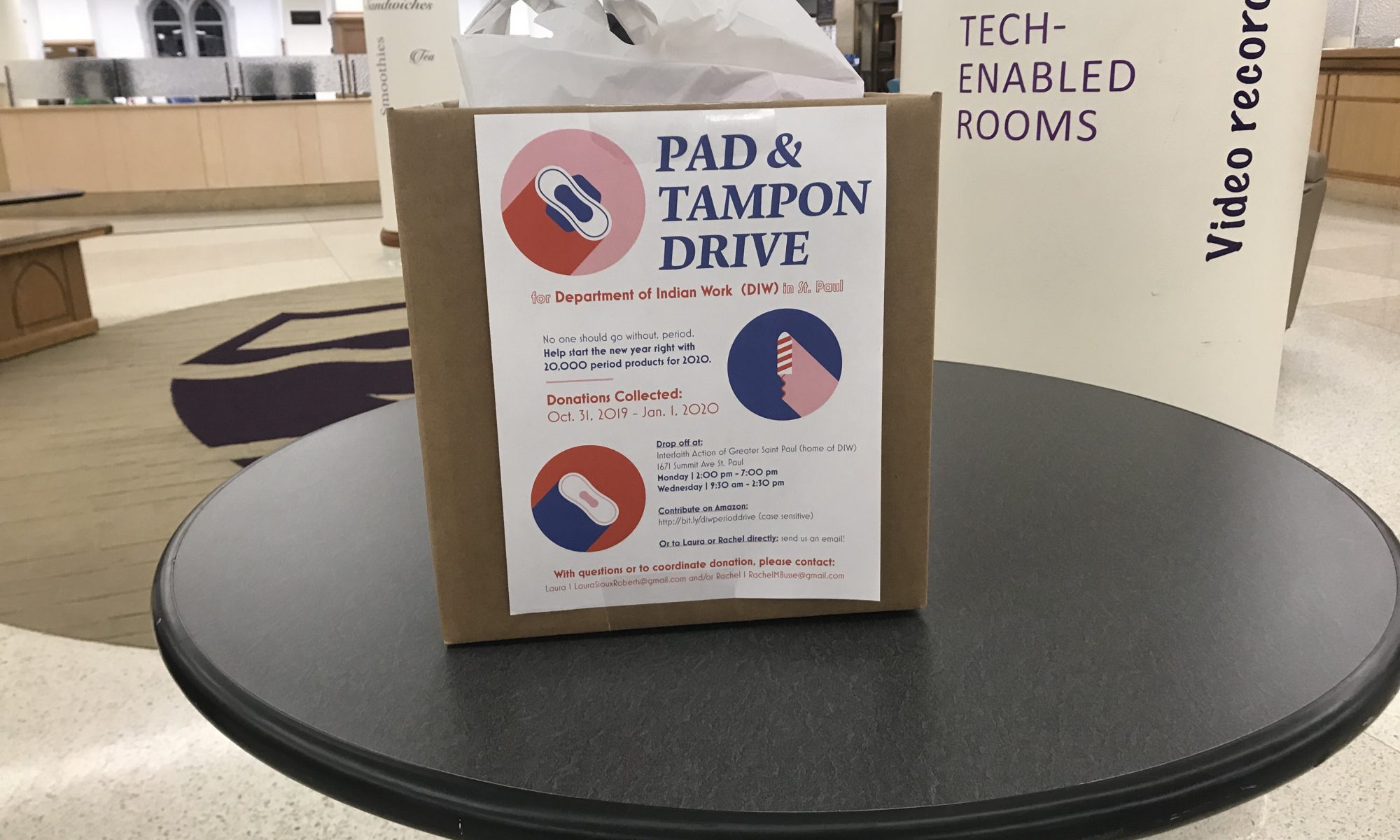 Pad and tampon drive boxes can be found across campus. The last day to donate on campus is Dec. 20, 2019. (Rachel Torralba/TommieMedia)
Pad and tampon drive boxes can be found across campus. The last day to donate on campus is Dec. 20, 2019. (Rachel Torralba/TommieMedia)
With a goal of collecting 20,000 feminine hygiene products, the pad and tampon drive is collecting products for women in need.
Donations will go to the Department of Indian Work (DIW), a St. Paul based nonprofit working for interfaith action. The boxes can be found at different places on the University of St. Thomas campus. The last day to donate is Dec. 20.
“It stems out of the Department of Indian work, which is a group that stemmed from supporting urban natives, because there aren’t a lot of reservations around here so there’s a lot of natives here,” said Savannah Thibert, Justice and Peace major. “There’s not one place where they can get together so there’s a lot of community organizing and support that happens.”
The products will be packed and given to native families in Ramsey County.
“All of the issues that natives face are very connected to each other. You can’t talk about homelessness without talking about discrimination, you can’t talk about menstrual justice without talking about homelessness either,” Thibert said. “There’s just so many things, everything fits together when you talk about social justice issues.”
There are 11 Federally recognized tribes in Minnesota. Still, many are unrecognized. Since there is not one specific tribe, Thibert felt that there is a stronger need to have a unified voice.
“There’s hidden issues that people don’t talk about,” Thibert said. “No one should have to choose between being hungry or being healthy and having a hygienic period. That’s just something that shouldn’t happen.”
Menstrual products are taxed as luxury items, so they are very expensive. St. Thomas alum Laura Roberts, who is Anshinaabe from the Red Lake Nation and Dakota from the Santee Nation, started the drive with Rachel Busse in 2016.
“I think anybody who has a period knows that it can be really expensive. And if you’re struggling to make ends meet, it’s not the thing you want to have to cut out,” Rachel Busse said. “We think it’s just a pretty simple justice issue. Everybody should have access to the hygiene items that they need.”
In 2016 Roberts was working with the American Indian Cancer Society and was working with DIW for an event. One day, she saw people asking for pads and tampons but they did not have any.
“Since I live in the community and I am Native American, this is really important to me and I can activate my community to do something about it,” Roberts said.
There are multiple boxes spread around the St. Thomas campus. Thibert made sure to add a box to OWS because she wanted to make sure STEM women were not left out.
“We’re almost on a yearly cycle with DIW now where they know that we do this drive and we’re really excited to support them each year,” Busse said. “It just sort of works out that the products last around about the amount of time until the next drive.”
At the time, there were not a lot of menstrual justice articles going out which talked about homeless women, Roberts said. While the project started with menstrual justice, Roberts explained there was also a need for infant formula, which is very expensive.
“Even though there is a strong warranted focus on breastfeeding, it’s not an option for all women and so it becomes really difficult for people in crisis who are either want to breastfeed and can’t or just have chosen not to for themselves. It’s just very difficult to overcome the financial barrier,” Roberts said.
Feminine hygiene products are not usually donated, so there is a need for these products.
“I’m really appreciative of Laura and Rachel and for the donors who donate to this drive, because it helps our families with such a needed item that is expensive to buy. When you are living in poverty, sometimes, buying food or buying those items can be tough,” Kelly Miller, Director for Department of Indian Work said.
“The community at the University of St. Thomas as well as mine and Rachel’s personal networks have really rallied around this every year and it’s just gotten bigger and bigger and we’re just really grateful for that,” Roberts said. “Our goal for DIW is that these donations for this year will carry them through until our donation drives next year.”
In 2016, the drive collected less than 4,000 items and they were really excited to drop that off. By the third year, they decided to make a goal of collecting 10,000 items, a goal they were uncertain if they could reach. However, they collected over 12,000 items.
“We just want this to be sustainable for DIW,” Roberts said. “We’re just really hoping that out of everything that they do we can take care of this one thing for them.”
Rachel Torralba can be reached at torr3544@stthomas.edu.

